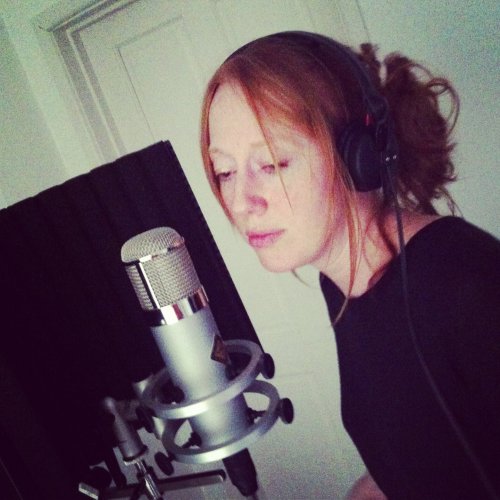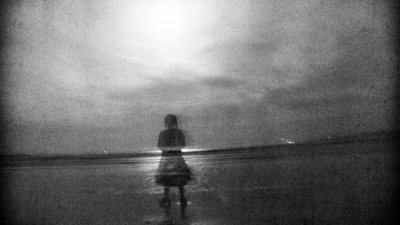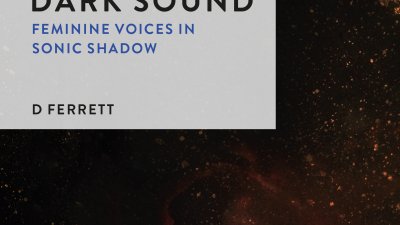Project details
| Project lead | Dr D Ferrett |
|---|---|
| Start date | Late 2015 |
| End date | Ongoing |
| Project website | www.bloomsbury.com/uk/dark-sound-9781501325809 |
A lover of blues, punk, noise, rock and indie, D Ferrett has always been drawn towards dark sounds and has spent much of her life writing and singing for bands before becoming a lecturer at Falmouth. The challenge tackled in the book Dark Sound: Feminine Voices in Sonic Shadow is in making the connection between dark sounds and a cultural zeitgeist increasingly referred to as 'dark', particularly with the re-emergence of right-wing politics and the backlash against feminism.
From an early age D was fascinated by the creatures of fairy stories and folklore and their mergers with the light and dark other-worldly beings of religious faiths. Later on, this interest developed into questioning and researching links between notions of darkness and misogyny, especially focussing on how women have historically and culturally been aligned with the dark and demonic (and as such, to be contained and controlled).
In 2012, D wrote a module for the BA(Hons) Popular Music course called Dark Sound. Rather than enforce a particular genre or style parameters, the aim was to provide musicians with a concept to work with the affective components of music and sound when it elicits forceful emotional and physical responses. The challenge set aimed to encourage musicians to write, perform and produce through exploring themes such as melancholy, rage, anger, desire and taboo subjects, stretching the limits of their work and exploring the 'dark side' of their own music.
In 2015, D curated a symposium called 'Dark Sound: Destructive Pop' during which academics and artists interpreted dark sound through combinations of theory and practice. After that, D worked with Greg Hainge and Paul Hegarty as the editors of the Ex:Centrics series (published by Bloomsbury) to put together a proposal for a book that would critically question the relationship between women, femininity and the darkness through sound and music.
In the book, D argues that the extreme limits and transgressions of dark sound not only imply the limits of language, but are moreover tied to a cultural and historical association between darkness and the feminine within music and music discourse. This is portrayed through a series of case studies that include Moor Mother, Anna Calvi, Björk, Chelsea Wolfe and Diamanda Galás. D shows how dark sound is charged with social, creative and political momentum and, while the oppressive and violent associations between darkness and femininity are acknowledged, D challenges their value to misogynistic, racist, capitalist and patriarchal power and instead presents a powerful movement in the shadows.
Project team
Dr D Ferrett is course leader for BA(Hons) Popular Music and a senior lecturer in Music. D's music practice is based in a diverse range of music styles extending through blues, punk, indie rock, drum and bass, and improvised music.

Dr D Ferrett - Project Lead
Dr D Ferrett is course leader for BA(Hons) Popular Music and a senior lecturer in Music. Since beginning her employment at Falmouth University in 2011, D has been instrumental in the development of the curriculum for music subject and has played a leading role in writing Falmouth's contemporary Popular Music degree course.
View profileOutcomes & outputs
Impact & recognition
Dark Sound: Feminine Voices in Sonic Shadow has received excellent peer reviews since publication:
"Finally dark music has a woman's voice to challenge the canon with demoniacal laughter, exuberant sophistication and a deliverance from dry analyses and dualisms. This book gives the reader the writing dark music has longed for and deserves, with innovative alchemy and philosophical wonder. This book changes musicology."
– Patricia MacCormack, Professor of Continental Philosophy, Anglia Ruskin University, UK
"Intersectional and disruptive, Dark Sound invites us to open our ears to the world that lies in shadows beyond traditional (male, white, heteronormative) listening ranges. The darkened orchestra out there has the power to obliterate the limits of language, ratio and patriarchy, and this fascinating book offers an exciting audio guide to the cacophony of the unsaid and the unheard."
– Isabella van Elferen, Professor of Music and School Director of Research and Enterprise, Kingston University London, UK, and author of Gothic Music: The Sounds of the Uncanny (2012)
"From the sirens who transfixed Odysseus to the 'Dark Lady' who prowls through Shakespeare's sonnets, from the ruthless sonic terrorism of Diamanda Galás to state-of-the-art black metal theory, this extraordinary meditation snakes through centuries of shadowy culture to weave together forbidden philosophies of sound, gender, and creativity. It is by turns symphonic, sizzling, and slinky, driven by a tempestuous intellectual energy that gathers obscurities, mysteries, and insurgencies into an unruly hymn – or an unforgiving lament – for the marginalized and defiant voices of the dark feminine."
– Nick Groom, Professor of Literature in English, University of Macau

